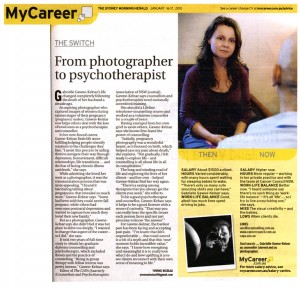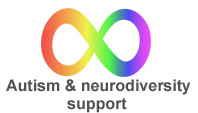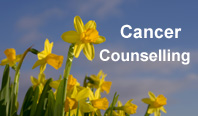Why I Became A Counsellor
From photographer to psychotherapist
Article by Yvonne Nicholas, first published in The Sydney Morning Herald.
In her new-found career, Gawne-Kelnar finds life more fulfilling helping people identify solutions to the challenges they face. “I assist this process by helping them to navigate their way through depression, bereavement, difficult relationships, life transitions… and the fear of facing chronic illness and death,” she says.
While admitting she loved her work as a photographer, it was the communication process that was more appealing. “I found it fascinating talking with women about their pregnancies; that revealed so much more,” Gawne-Kelnar says. “Some had been told they could never become pregnant, while others had overcome postnatal depression and wanted to capture how much they loved their new family.”
But as a photographer, Gawne-Kelnar says she didn’t feel it was her place to delve too deeply. “I wanted to change that aspect of the career – so I did,” she says.
It took two years of full-time study to obtain her postgraduate diploma (counselling and psychotherapy), which included theory and the practice of counselling. “Being in group therapy with fellow interns was pretty intense,” Gawne-Kelnar says.
Editor of The CAPA Quarterly (Counsellors and Psychotherapists Association of NSW journal), Gawne-Kelnar says counsellors and psychotherapists need nationally accredited training.
She also did a Lifeline telephone counselling course and worked as a volunteer counsellor for a couple of years.
Having emerged from her own grief to assist others, Gawne-Kelnar says she knows first-hand the power of counselling.
“Initially, pregnancy photography was a wonderful healer, as it focused on birth, which helped me ease my pain about death,” she explains. “But gradually, I felt ready to explore life – and counselling is all about life in all its complexities.”
The long and winding road of life and exploring the life of her clients – and her own – helped Gawne-Kelnar find her way again.
“There’s a saying among therapists that you always get the clients you need,” she reflects.
To be a good psychotherapist and counsellor, Gawne-Kelnar says it helps to be a good listener with a sense of curiosity. “That way you can really hear the specific issues each person faces and not just presume to know ‘the answer’.”
For Gawne-Kelnar, the hardest part has been facing and accepting past pain. “I’ve learnt that life’s unpredictable…that total control is a bit of a myth and that this ‘now’ moment holds incredible value,” she says. “I know how energising and meaningful it is to really love what I do and how uplifting it is to see clients reconnect with their own sense of meaning in life.”
.


